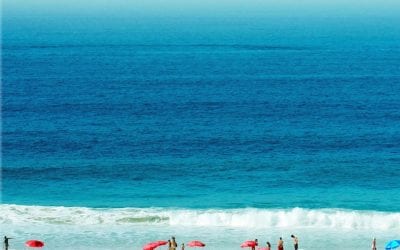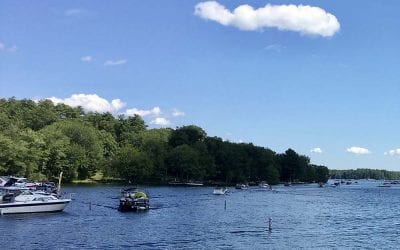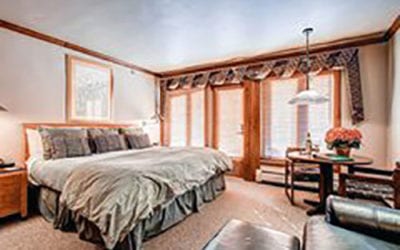Relaxing in a hot shower, walking to a nearby market to buy meat or strolling through a village may seem like commonplace occurrences. But in the African country of Uganda, these experiences are likely to be unlike life as you’re used to living it.
For instance, the shower consists of hot water poured into a tank on the roof of a tent, which drips through holes in a bucket onto the bather below. The meat is large body parts of animals, some unidentifiable, strung up in an outdoor marketplace. And, villages often are groupings of mud-brick huts with thatch roofs and dirt floors.

Hot shower in the making
An early impression of Uganda during my recent visit was how much diversity is squeezed into an area about the size of Montana. Broad plains of dry savannah and lush rain forests cover much of the country. Despite the fact that it’s landlocked, fully a quarter of the nation is covered by water. That includes a section of the Nile River and Lake Victoria, the second largest freshwater lake in the world after Lake Superior.
Most people visit this African destination, like others nearby, to observe a Noah’s Ark variety of wildlife in its natural habitat. However, I found life of another kind to be equally intriguing.
 Some 35 million people, many of them among the poorest in the world, retain a lust for life which often has treated them badly. A recent past that included brutal dictators and vicious warlords has not quelled the tendency of most Ugandans to deal philosophically with whatever mishaps and misfortunes come their way.
Some 35 million people, many of them among the poorest in the world, retain a lust for life which often has treated them badly. A recent past that included brutal dictators and vicious warlords has not quelled the tendency of most Ugandans to deal philosophically with whatever mishaps and misfortunes come their way.Given an often violent history and grinding poverty, in which more than one third of the people are said to live on less than $1.25 a day, the amiable demeanor that generally greets visitors comes as a welcome surprise. This attitude is demonstrated in many ways and situations.
Many women till the soil on hillsides so steep I wonder how they can stand, wearing the traditional colorful, flowing dress. Some have a baby napping in a sling on their back. As they swing their crudely made hoe, passers-by often hear them chatting and laughing with neighbors toiling in adjacent fields.
 Wide smiles adorn the faces of children. They play near their homes, often with sticks and stones as their only toys, or wave to passing vehicles transporting visitors in their country. Their excitement and broad grins prompted my wife Fyllis and me, and our eight traveling companions, to return every smile and wave that came our way as our Land Rover headed for our next destination.
Wide smiles adorn the faces of children. They play near their homes, often with sticks and stones as their only toys, or wave to passing vehicles transporting visitors in their country. Their excitement and broad grins prompted my wife Fyllis and me, and our eight traveling companions, to return every smile and wave that came our way as our Land Rover headed for our next destination. Memories of other scenes also continue to dance in my head. I still picture lines of women and children walking alongside roads that are more pothole than pavement, balancing a variety of bundles on their head. These might be a bunch of bananas, laundry just washed in a stream, a heavy five gallon plastic container of water pumped from the village well or anything else that needs to be moved from here to there. Many schoolchildren tote their books on their head, their version of the backpack carried by youngsters in the United States.
Memories of other scenes also continue to dance in my head. I still picture lines of women and children walking alongside roads that are more pothole than pavement, balancing a variety of bundles on their head. These might be a bunch of bananas, laundry just washed in a stream, a heavy five gallon plastic container of water pumped from the village well or anything else that needs to be moved from here to there. Many schoolchildren tote their books on their head, their version of the backpack carried by youngsters in the United States.Bicycles and motorbikes, both ridden and pushed, are used to transport larger and heavier items. I spotted them laden with cages of live chickens, heavy bags of charcoal which is used for cooking and a live goat slung across the lap of a man driving to an outdoor market.
Person-to-person encounters with Ugandans provided even more insight into their lifestyle. Lunch with a local man, which had been arranged for the ElderTreks tour group with which we traveled, introduced us to typical cuisine. Our meal included beef from the long-horned cattle that are common there, cassava, sweet potato, plantain and mashed roasted peanuts.
Deo Karegyesa, a farmer with whom we visited, explained that he often sleeps near his sweet potato crop to keep foraging bush pigs away. He proudly pointed to a deep trench that he had dug with help from his neighbors to prevent elephants from destroying his crops.
 As we chatted with Alfonse Bifumbo, a traditional healer, in his thatch-roof house, chickens pecked at the dirt floor and goats bleated outside. Wearing a floppy hat and perpetual grin, he described herbs he uses to treat ailments that range from malaria to ear, eye and nose problems, and to drive away evil spirits that he said sometimes possess people. He also proudly proclaimed that he has three wives and a total of 13 children.
As we chatted with Alfonse Bifumbo, a traditional healer, in his thatch-roof house, chickens pecked at the dirt floor and goats bleated outside. Wearing a floppy hat and perpetual grin, he described herbs he uses to treat ailments that range from malaria to ear, eye and nose problems, and to drive away evil spirits that he said sometimes possess people. He also proudly proclaimed that he has three wives and a total of 13 children.When not being introduced to some of the friendly and fascinating people of Uganda, members of our tour group ventured out on game drives and boat cruises for close-up encounters with the animals that also make Uganda their home. A follow-up article will describe those experiences.
Indeed, the adrenaline rush of a charging mountain gorilla and stately beauty of lions sprawled over tree branches are but two of innumerable animal experiences that linger in my memory. Equally fascinating to me were encounters with people whose culture and lifestyle are very different from mine. These are among reasons why several of my traveling companions described their visit to Uganda as the trip of a lifetime.
If you go
A safari trip to Africa isn’t best undertaken as a do-it-yourself affair. My wife and I went there with ElderTreks, which since 1987 has conducted off-the-beaten-path trips for people 50 and over to more than 100 countries. Among benefits it offers are small groups limited to no more than 16 travelers, highly efficient trip preparation, outstanding local guides and inclusion of all meals, which is not true for some tour companies.
Our accommodations ranged from a luxury hotel to a sophisticated hillside lodge overlooking tea plantations to spacious tented wilderness camps with a private bathroom, including that bucket shower. Monkeys, hippos and wart hogs were among animals that hung around some camps and provided yet more opportunities to observe wildlife at close range.
This year, ElderTreks will offer its Uganda trip and a combination Uganda and Rwanda itinerary. For more information about what may prove to be your trip of a lifetime, call ElderTreks at (800) 741-7956 or log onto eldertreks.com.

After gallivanting throughout the United States and to more than 75 other countries around the world, and writing about what he sees, does and learns, Victor Block retains the travel bug. He firmly believes that travel is the best possible education, and claims he still has a lot to learn. He loves to explore new destinations and cultures, and his stories about them have won a number of writing awards.




